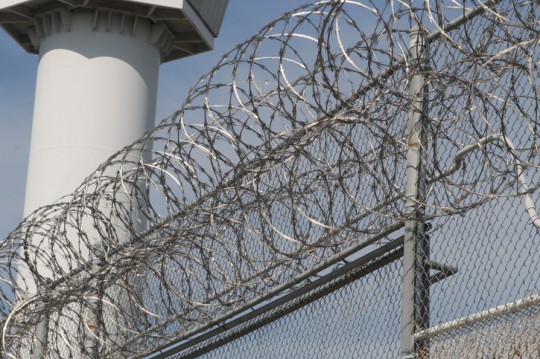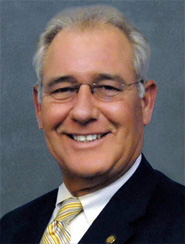Prison Investigators Testify About Being Silenced
March 11, 2015
Testifying under oath Tuesday before a Senate panel, current and former Department of Corrections investigators — including the sheriff of Gulf County — said they were ordered by the inspector general’s office to quash cases that could embarrass the agency or high-ranking officials.
Gulf County Sheriff Mike Harrison told the Senate Criminal Justice Committee that, as a corrections investigator, he was twice told by “upper-level management” in the inspector general’s office of the Department of Corrections not to pursue criminal charges against corrupt, high-ranking officials.
 Investigators were encouraged to pursue administrative cases — which could end in firings but not criminal charges — “to make it look favorable upon the department,” Harrison said after being sworn in, a rarely used option available to committee chairmen and ordered Tuesday by Chairman Greg Evers, R-Baker.
Investigators were encouraged to pursue administrative cases — which could end in firings but not criminal charges — “to make it look favorable upon the department,” Harrison said after being sworn in, a rarely used option available to committee chairmen and ordered Tuesday by Chairman Greg Evers, R-Baker.
“Criminal charges on a high-ranking colonel or warden or assistant warden would obviously be a black eye on DOC,” Harrison, who left the inspector general’s office in December 2012 after being elected sheriff.
Harrison said he was told not to pursue criminal charges against a former Jackson Correctional Institution warden and assistant warden regarding a cover-up of the medical treatment of an inmate at the Panhandle prison in which two inmates nearly lost their lives.
The state attorney’s office originally declined to take the case but agreed to bring charges against former warden Ted Jeter and assistant warden CarolAnn Bracewell after Harrison and another investigator obtained additional sworn testimony indicating that the pair had pressured workers into keeping silent about what happened, Harrison said.
“It was initially declined by the state attorney’s office but with the new information he indicated to bring it back to him and we were instructed not to do so,” he told the panel.
Doug Glisson, who was Harrison’s supervisor at the time and still works for Inspector General Jeffrey Beasley, said the decision not to pursue criminal charges came from Beasley. Glisson is one of a handful of inspectors who filed a lawsuit against Gov. Rick Scott, Beasley and others alleging they were denied whistleblower status and faced retaliation after exposing a cover-up involving the 2010 death of an inmate at a Panhandle prison who died after being repeatedly sprayed with noxious chemicals. A federal judge recently dismissed the case, but the inspectors’ lawyer said he plans to appeal.
Harrison told the committee he was also instructed not to pursue a criminal case against a colonel at Holmes Correctional Institution who had been accused of smuggling contraband into the prison. Harrison said he ignored his superiors and brought the case to the state attorney, who later pressed charges against the colonel, who is now on probation.
“I come from a law-enforcement background,” Harrison, who worked for the inspector general’s office for about two years, said. “I was used to, if someone broke the law, that you took the charges to the state attorney’s office and you proceed forward. That didn’t appear to be the case within the inspector general’s office. It was quite frustrating with me.”
 Evers, who has sponsored a sweeping prison overhaul (SB 7020) that would create a commission with investigatory powers to oversee the policing of prisons, said he wants “to dig deeper” into Harrison’s accusations about Beasley’s office.
Evers, who has sponsored a sweeping prison overhaul (SB 7020) that would create a commission with investigatory powers to oversee the policing of prisons, said he wants “to dig deeper” into Harrison’s accusations about Beasley’s office.
“I think it should be referred to somebody or allow us to continue to dig. Apparently we can stumble across more than what the investigations have found in the past few years, just by asking questions of the right people,” Evers said.
Evers said he would support the creation of a special legislative joint committee to look into allegations of cover-ups within the office of the inspector general.
“We’ve got a problem. I said several meetings back that we’ve got a crisis. Yes, we’ve got a crisis,” he said.
Tuesday’s testimony from Glisson and Harrison indicated a pattern of Beasley’s office preventing inspectors from going after senior officials and focusing instead on “low-hanging fruit,” as characterized by an anonymous investigator in a letter highly critical of Beasley sent to Evers.
Glisson told the committee on Tuesday that he was told to drop an investigation into a high-ranking corrections official’s possible involvement with wrongdoing at a training academy.
Two days after one of Glisson’s inspectors asked the official about the academy, “we were called to the office of the inspector general and we were warned that the person we had named as a subject, that there was a ‘Capitol connection’ with this individual,” Glisson said.
“It just had a chilling effect,” he said.
Glisson and his inspector then were told to go through the official himself if they wanted any information pertaining to the investigation.
“Again, inspectors and investigators are supposed to have unfettered access to documentation, to talk to who we want. But now we’re being told specifically you’ll go through this person who’s been named as a subject,” he said. “We thought it was inappropriate.”
Department of Corrections Secretary Julie Jones has steadfastly stood by Beasley — who answers to Scott’s Inspector General Melinda Miguel — since she took over the post in January. Jones defended him again Tuesday.
“I have the utmost confidence in the abilities of the Office of Inspector General and department staff to take decisive action in the interest of safety and security for both themselves and the inmates in our custody,” Jones said in a statement.
The cases referenced in Tuesday’s hearing “happened years ago” and were “declined due to a lack of probable cause or sufficient evidence, she said.
“When a case is declined by the state attorney’s office for criminal prosecution, and there is evidence to prosecute civilly, investigators are encouraged to take decisive action to ensure that the individuals in question are held accountable,” Jones said. “I am personally disappointed that the environment in which current and former department staff were asked to testify did not allow for the presentation of all known facts regarding the incidents in question.”
by Dara Kam, The News Service of Florida
Comments
One Response to “Prison Investigators Testify About Being Silenced”



So thankful that I did not get mixed up in the corrections merry go round.
I feel for those who have to work in such an environment, and are ruled over by such a criminal element of Florida government.